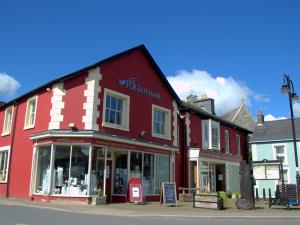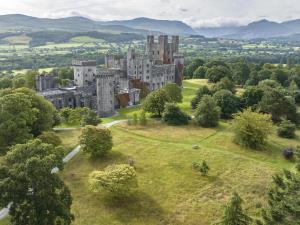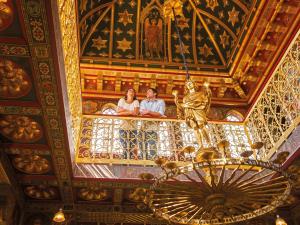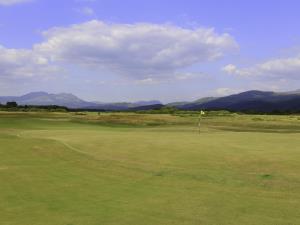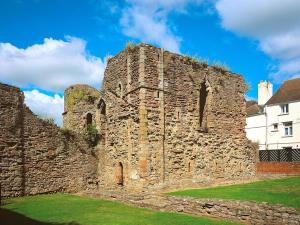A celebration of the strong connections between Wales and the British royal family.
Golden rings
When the Prince of Wales, then Prince William, slipped a wedding ring onto Kate Middleton’s finger in 2011, it was a band of pure Welsh gold, following in a tradition founded by The Queen Mother in 1923. Since then, all major royal weddings have been sealed with Welsh gold.
If you want to pop the question to your beloved, why not try one of these romantic ways to do so in Wales? If the answer is yes, you can buy Welsh gold for your own rings from the Rhiannon Centre in Tregaron in Ceredigion. Visitors can even watch as jewellery is made by local Welsh speaking goldsmiths.
After exchanging rings, William and Kate lived on Anglesey, where the prince worked as a search-and-rescue helicopter pilot.

Royal Victorian tours
Queen Victoria and Prince Albert stayed in Penrhyn Castle, near Bangor, in 1859 when they visited North Wales. Today visitors can see the one ton slate bed commissioned for the royal guests. Queen Victoria refused to sleep in it, saying it reminded her of a tomb.

Queen Victoria visited North Wales again in 1889, staying in Palé Hall, in the Dee Valley near Bala. Victoria was so enchanted by Palé Hall and its surrounding that she rearranged her itinerary in order that she could stay much longer than originally planned. It is now a luxury hotel with 18 rooms, including the Victoria room that the Queen stayed in. The room features the original bath and basin used by the Queen. The half tester bed is believed to be the same one slept in by Victoria. Guests can dine in style in the Michelin Green Star Henry Robertson Dining Room, where Head Chef Laurence Webb brings his expertise and new à la carte menu or treat enjoy a private dining experience. There a number of walks, including the Queen’s Walk that Victoria enjoyed along the banks of the river Dee.


It's in the jeans
In January 2018, the Duke of Sussex and Meghan, the Duchess of Sussex (then Ms Meghan Markle) made a visit to Cardiff when they were engaged. Hundreds of people greeted them in Cardiff Castle. Further demonstrating her love of the country, Ms Markle chose to wear a pair of slim black jeans by the Welsh denim brand Hiut Denim.


Based in Cardigan, Hiut Denim is a small company founded by husband and wife David and Claire Hieatt. The team make every item by hand, which is no speedy process. After Ms Markle's visit, Hiut Denim had a three month waiting list on orders and had to increase their staff numbers and factory size to keep up with demand.
Edwardian drives
Edward VII was a passionate golfer, and he granted Royal status to his two favourite golf courses in Wales: Royal Porthcawl and Royal St David’s. The King’s grandson, the future Edward VIII, was also a keen golfer, captaining Royal St David’s in 1934 underneath the shadow of Edward I's castle.
Victoria's royal retainers
Queen Victoria’s knickers were supplied by Sir Pryce Pryce-Jones, who founded the world’s first mail-order company in Newtown, the capital of the Welsh flannel industry. His soft flannel knickers were favoured by many of the crowned heads (and bottoms) of Europe, including the Queen of Norway and the Empress of Russia. Queen Victoria no doubt wore hers on visits to her Welsh estate, Ynyshir, which is now a luxurious two Michelin star restaurant with rooms.



Royal memorabilia
Plas Dinas Country House in Caernarfon is the former home of the Armstrong-Jones family, where Lord Snowdon and Princess Margaret lived. It is now a luxury hotel with 10 individually designed rooms. Guests can see the collection of royal memorabilia from the time and stay in the redesigned Princess Margaret room.
Hard-bitten Henry V
Born in Monmouth Castle in 1386, Henry V spent much of his youth in Wales fighting against the rebellion of Owain Glyndŵr. By the time Henry succeeded his father to the throne in 1413, he was a hard-bitten veteran of battle. This helped him to defeat the French at the Battle of Agincourt during the hundred year war, at which Welsh archers played a crucial role.
Henry Tudor's march to power
Henry Tudor (Harri Tudur in Welsh) was born at Pembroke Castle in 1457 and was a descendant of several Welsh royal houses. During the Wars of the Roses (1455–1485) he fled to Brittany, returning with a small army that landed near Milford Haven. He gathered 5,000 more soldiers on his march through Wales then defeated Richard III at the Battle of Bosworth Field in 1485 to become Henry VII. The Tudors reigned for the next 120 years.
Despite his Welsh ancestry, his son Henry VIII kept an iron grip on Wales. He passed the 1536 Act of Union which legally incorporated Wales into England. The Act banned Welsh-only speakers from public office, but he didn’t manage to suppress the Welsh language, not even in his own family: his daughter Queen Elizabeth I apparently spoke fluent Welsh!


Llywelyn's last stand
Llywelyn ap Gruffydd was the last prince of an independent Wales before its conquest by Edward I. From his Gwynedd powerbase, he controlled most of Wales until he was killed in 1282 by English soldiers at Cilmeri. There’s a memorial stone there to commemorate Ein Llyw Olaf ('Our Last Leader'), and an annual ceremony is held on the anniversary of his death.

Rebel with a cause
In the early 15th century, Owain Glyndŵr led a spectacular rebellion against the crown that briefly united Wales. He studied law in London and fought for the English king, then retired to his Welsh estates for a more peaceful life. At one point, he was drawn into land disputes with a neighbouring baron, and by 1400 it'd grown into full-scale rebellion. His supporters proclaimed him Prince of Wales, and in 1404 Owain held his first Welsh parliament at Machynlleth. It wasn’t to last, but he was never betrayed or captured. He vanished in 1412, and is believed to have lived out his life in Herefordshire.


A gift for a queen
The Great House in Laleston, near Bridgend, is a beautiful 15th century Grade II listed building. It that is believed to have been a gift from Queen Elizabeth I to her suitor and court favourite Robert Dudley, the Earl of Leicester. The earl used the Great House as a hunting lodge. The property is also said to have been home to Anne Boleyn, the second wife of King Henry VIII. It is rumoured that Shakespeare stayed at the Great House too.
Historical country hall
Llangoed Hall Hotel is a magnificent 23 bedroom country house hotel in the enchanting Wye Valley. It boasts an extraordinary long history - all the way back to 560AD when, according to legend, it was the site of the first Welsh Parliament. The house, which was originally won in a card game, has been passed down by nobleman to nobleman and even at one time was redesigned by Clough Williams Ellis, the genius behind the Italianesque village of Portmeirion.
Llangoed owns a Rolls Royce which was given to the Queen Elizabeth the Queen Mother on the birth of Elizabeth II (then, Princess of York). Llangoed is not only popular to the British royals, other guests include sultans, sheikhs and other notable people.
The hotel, which has an impressive collection of fine art and an award-winning dining room with fruit and vegetables from its organic garden, now hosts lavish parties and weddings.




